
Lorenzo di Piero de' Medici, known as Lorenzo the Magnificent, was an Italian statesman, the de facto ruler of the Florentine Republic, and the most powerful patron of Renaissance culture in Italy. Lorenzo held the balance of power within the Italic League, an alliance of states that stabilized political conditions on the Italian Peninsula for decades, and his life coincided with the mature phase of the Italian Renaissance and the golden age of Florence. As a patron, he is best known for his sponsorship of artists such as Botticelli and Michelangelo. On the foreign policy front, Lorenzo manifested a clear plan to stem the territorial ambitions of Pope Sixtus IV, in the name of the balance of the Italic League of 1454. For these reasons, Lorenzo was the subject of the Pazzi conspiracy (1478), in which his brother Giuliano was assassinated. The Peace of Lodi of 1454 that he supported among the various Italian states collapsed with his death. He is buried in the Medici Chapel in Florence.
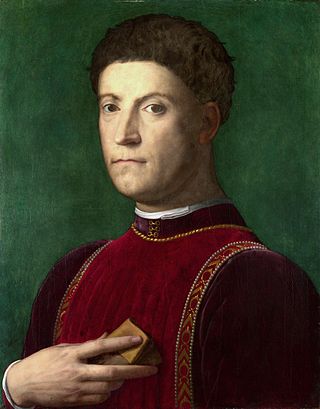
Piero di Cosimo de' Medici, known as Piero the Gouty, was the de facto ruler of Florence from 1464 to 1469, during the Italian Renaissance.
Salvatore Giuliano was an Italian brigand, who rose to prominence in the disorder that followed the Allied invasion of Sicily in 1943. In September of that year, Giuliano became an outlaw after shooting and killing a police officer who tried to arrest him for black market food smuggling, at a time when 70 percent of Sicily's food supply was provided by the black market. He maintained a band of subordinates for most of his career. He was a flamboyant, high-profile criminal, attacking the police at least as often as they sought him. In addition, he was a local power-broker in Sicilian politics between 1945 and 1948, including his role as a nominal colonel for the Movement for the Independence of Sicily. He and his band were held legally responsible for the Portella della Ginestra massacre, though there is some doubt about their role in the numerous deaths which occurred.

Michael Francis Corleone is a fictional character and the protagonist of Mario Puzo's 1969 novel The Godfather. In the three Godfather films, directed by Francis Ford Coppola, Michael was portrayed by Al Pacino, for which he was twice-nominated for Academy Awards. Michael is the youngest son of Vito Corleone, a Sicilian immigrant who builds a Mafia empire. Upon his father's death, Michael succeeds him as the don of the Corleone crime family.
Geoffrey Giuliano is an American author of biographies of rock musicians.

Rodrigo is an opera in three acts composed by George Frideric Handel. Its original title was Vincer se stesso è la maggior vittoria. The opera is based on the historical figure of Rodrigo, the last Visigothic king of Spain. The libretto was based on Francesco Silvani's II duello d'Amore e di Vendetta. Dating from 1707, it was Handel's first opera written for performance in Italy, and the first performance took place in Florence late in 1707.

The Sicilian is a novel by American author Mario Puzo. Published in 1984 by Random House Publishing Group (ISBN 0-671-43564-7), it is based on the life of Sicilian bandit Salvatore Giuliano. It is set in the same universe as Puzo's most famous work, The Godfather (1969), and contains characters from The Godfather. It is regarded as The Godfather's literary sequel and is the second book in The Godfather novel series. It was adapted into a film in 1987, though all Godfather references were removed for copyright reasons in the film adaptation.

Simonetta Vespucci, nicknamed la bella Simonetta, was an Italian noblewoman from Genoa, the wife of Marco Vespucci of Florence and the cousin-in-law of Amerigo Vespucci. She was known as the greatest beauty of her age in Italy, and was allegedly the model for many paintings by Sandro Botticelli, Piero di Cosimo, and other Florentine painters. Some art historians have taken issue with these attributions, which the Victorian critic John Ruskin has been blamed for promulgating.
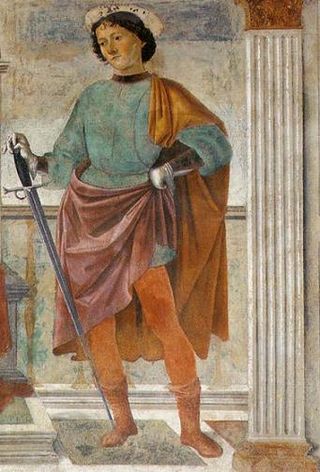
Saint Julian the Hospitaller is a saint venerated in the Roman Catholic Church and Eastern Orthodox Church. He is the patron saint of the cities of Ghent, Belgium; Saint Julian's, Malta; and Macerata, Italy.

Rossella Giordano is an Italian race walker.

Giuliano da Maiano (1432–1490) was an Italian architect, intarsia-worker, and sculptor, the elder brother of Benedetto da Maiano, with whom he often collaborated.

Eliogabalo (Heliogabalus) is an opera by the Italian composer Francesco Cavalli based on the reign and assassination of the debauched teenage Roman emperor Heliogabalus. The author of the original libretto remained anonymous, but it was probably reworked by Aurelio Aureli. The opera was composed in 1667 and was intended to be premiered during the Venetian Carnival season of 1668. In fact, it was not staged in Cavalli's lifetime and was replaced with a revised text by Aureli, in which Eliogabalo repents and lives, and with music by the much younger composer Giovanni Antonio Boretti, perhaps because Cavalli's style was considered too old-fashioned or because the Jesuits, who were regaining power in Venice at the time, were thought likely to oppose putting a story about a regicide on stage.
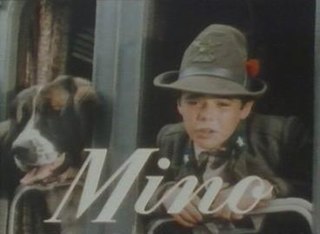
Mino was the eighth ZDF-Weihnachtsserie, and aired in 1986. The series was broadcast in Germany on ZDF, and consisted of 6 episodes. Broadcasting in Germany began on 25 December 1986. The series was also broadcast in Italy, and consisted of 4 episodes. Broadcasting in Italy began on 28 December 1986. The series was an Italian-German co-production. It was inspired by the Italian novel The little Alpino by Salvator Gotta.
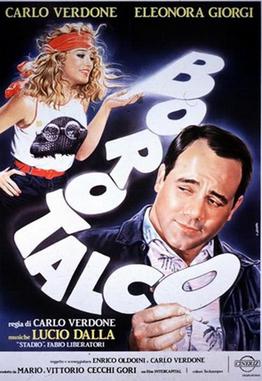
Talcum Powder is a 1982 Italian comedy film written, starring and directed by Carlo Verdone.

Rossella Fiamingo is an Italian left-handed épée fencer and two-time individual world champion. A three-time Olympian, Fiamingo is a 2021 and 2024 team Olympic bronze and Gold, respectively, medalist and 2016 individual Olympic silver medalist.
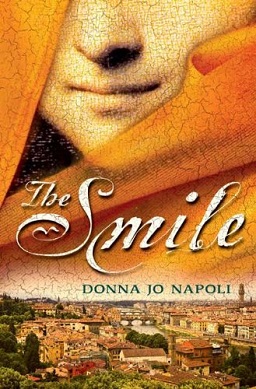
The Smile (2008) is a Young Adult novel by Donna Jo Napoli that details a slice of the life of Monna Elisabetta, better known as the Mona Lisa. Some historical figures enter the plot, including Leonardo da Vinci and members of the famous Medici family. Set in Renaissance Florence, it follows Elisabetta's life up to the moment she models for da Vinci's painting, and suggests the secret behind her famous smile.
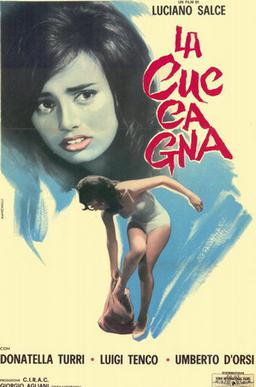
La cuccagna, internationally released as A Girl... and a Million, is a 1962 Italian drama film directed by Luciano Salce.

Giuliano-Dalmata is the 31st quartiere of Rome, identified by the initials Q. XXXI. Its name refers to the Julian, Istrian and Dalmatian refugees that settled there in the postwar period.

The Via Palestro massacre was a terrorist attack carried out by Cosa Nostra in Milan on the evening of 27 July 1993. The explosion of a car bomb in Via Palestro, near the Galleria d'Arte Moderna, resulted in the killing of five people and the wounding of twelve.

Rossella Artioli is an Italian teacher and former politician. She was a member of the Chamber of Deputies for the Italian Socialist Party.

















